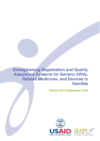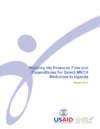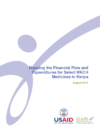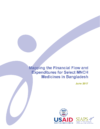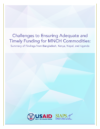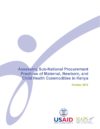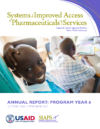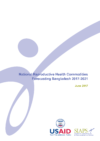In Namibia, USAID has been providing funding for technical assistance in the areas of pharmaceutical management and systems strengthening since 2003. During this period, the Rational Pharmaceutical Management Plus (RPM Plus) and Strengthening Pharmaceutical Systems (SPS) programs were implemented. RPM Plus supported interventions that largely focused on strengthening systems for the antiretroviral therapy (ART) and … Read more
Since the report of the United Nations Commission on Life-saving Commodities for Women and Children (UNCoLSC) was published in 2012, much has been done to highlight the challenges countries face in ensuring the availability of essential commodities and to create resources to assist countries in this endeavor. In most settings, these commodities are procured with government … Read more
Since the report of the United Nations Commission on Life-Saving Commodities for Women and Children (UNCoLSC) was published in 2012, much has been done to highlight the challenges countries face in ensuring the availability of essential commodities and to create resources to assist countries in this endeavor. In most settings, these commodities are procured with government … Read more
Since the report of the United Nations Commission on Life-saving Commodities for Women and Children (UNCoLSC) was published in 2012, much has been done to highlight the challenges countries face in ensuring the availability of essential commodities and to create resources to assist countries in this endeavor. In most settings, these commodities are procured with government … Read more
As countries pursue the maternal, newborn, and child health (MNCH) targets established under Sustainable Development Goal 3, they will need to ensure the continuous availability of essential health commodities to prevent and treat the conditions that cause morbidity and mortality in those groups. Since the report of the United Nations Commission on Life-Saving Commodities for … Read more
The SIAPS Program works at both the global and country levels to improve pharmaceutical management systems that increase access to quality medicines. SIAPS has developed a methodology to assess sub-national procurement practices. This methodology was used in Kenya to assess county-level procurement practices for essential maternal, newborn, and child health (MNCH) commodities and to study … Read more
To learn more about SIAPS program activities worldwide, please read our annual report for program year 6.
In 2012, SIAPS supported the Directorate General of Family Planning (DGFP) in conducting a five-year (2012-2016) forecasting exercise for reproductive health commodities and built the technical capacity of DGFP officials to manage the forecasting processes and analyze the FP2020 indicators pertinent to stock availability. SIAPS also assisted DGFP in forming the multi-stakeholder Forecasting Working Group (FWG) … Read more
The SIAPS team in Namibia joined other PEPFAR-implementing partners for the orientation of USAID’s newly appointed Director for Southern Africa, Mr. John Groarke. On September 27-28, 2017, Mr. Groake visited health facilities in the Omusati and Oshana regions in the North Central part of Namibia where he received updates on the progress of the community-based … Read more
The Philippines has one of the highest TB burdens in the world—and 2.6% of its more than 286,000 new cases in 2015 were of multi-drug-resistant TB (MDR-TB). This threatens the progress the country has made in addressing the deadly disease over the past few decades and its goal to make the country TB-free by 2030. … Read more
